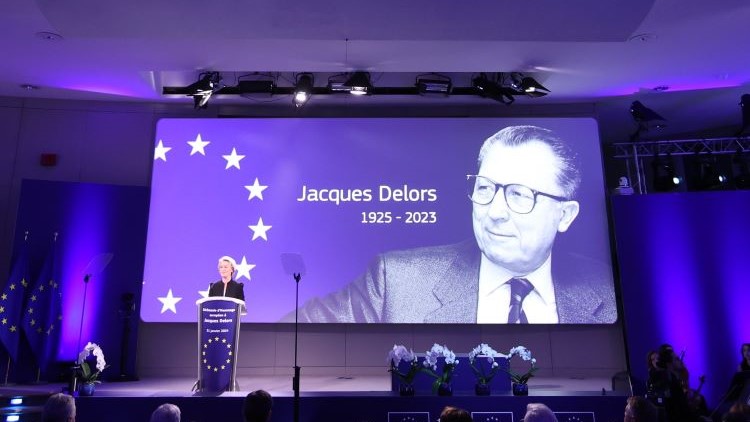Eduardo González
The European Commission (EC) yesterday fired Jacques Delors, the so-called ‘architect of Europe’, on the eve of a fundamental European summit to consolidate the EU’s commitment to Ukraine and its future accession to the European family.
The tribute event was attended by the family of Jacques Delors and 18 European leaders, including the president of the European Commission, Ursula von der Leyen; the president of the Government, Pedro Sánchez; Belgian Prime Minister Alexander de Croo (in his capacity as acting president of the EU Council); the German chancellor, Olaf Scholz; the Dutch Prime Minister, Mark Rutte; the Portuguese Prime Minister, António Costa; the Greek Prime Minister, Kyriakos Mitsotakis; Romanian Prime Minister Klaus Werner Iohannis; the Lithuanian Prime Minister, Gitanas Nausėda; and the Polish Prime Minister, Donald Tusk.
“Today, in Brussels, we pay tribute to Jacques Delors,” declared Pedro Sánchez through his official account on the social network X. “Thanks to his unwavering commitment, the dream of a united, open and modern Europe became possible,” he continued. According to Sánchez, “Delors is a source of inspiration to continue working for a more resilient, stronger and fairer European Union.” “We will continue to protect freedoms, social justice and solidarity as fundamental values of our Union, in defense of the well-being of citizens,” he concluded.
All the speakers highlighted Delors’ role as one of the great architects of European integration, who managed to advance the European Union project and leave a legacy that includes, among other achievements, the Union’s single market, the Treaty of Maastricht, the economic and monetary union or the Erasmus program.
“Jacques Delors was a visionary who made Europe stronger,” Von der Leyen said during her speech. “His work had a profound impact on the lives of generations of Europeans, including mine,” she added.
The president recalled that Delors began governing Europe in the midst of an economic crisis and great political tensions. “These were years that observers called a ‘period of Eurosclerosis,’” and, therefore, “from his appointment, Jacques Delors realized that he had to get the ball rolling again if he wanted to regain the trust of the Europeans,” she claimed.
The result of this, she continued, was the promotion of the single market project, one of the pillars of the EU, which encompasses 447 million people and allows the free movement of goods, capital, services and citizens. “Jacques Delors was a master tactician and a patient negotiator, qualities that were indispensable in getting the Germans to accept the euro,” she recalled. “Not all Germans believe in God, but they all believe in the Bundesbank,” Von der Leyen said, quoting Delors himself. “I can confirm that!” she added, with humor.
According to the president, “Jacques Delors used to say that our EU was an ‘Unidentified Political Object’”, but, “deep down, he taught us that what really matters is that we adapt to new needs, that what matters is that we act with ambition and realism to take on new challenges” and, to this end, he decided to “take a step forward for Europe and its people.”
Eve of the Extraordinary European Council
The presence of the European leaders in Brussels occurred on the eve of the extraordinary European Council meeting, in which the heads of state and government of the EU will try to overcome the veto of the Hungarian Prime Minister, Viktor Orbán, to the aid of 50 billion euros for Ukraine in the next four years.
Precisely, De Croo took advantage of his speech at the event to ask EU leaders to be “inspired” by the legacy of Jacques Delors during the Council meeting and decide to “collectively” help Ukraine. “Tomorrow, when we meet to discuss the necessary financial aid for Ukraine, we must show the same level of unity,” because “our support must not be limited to mere words, but must be a firm contribution to the independence and freedom of citizens.” Ukrainians,” he warned.
António Costa, who also spoke at the event, stated that it is “imperative” to move forward with the enlargement of the EU after the Russian invasion of Ukraine and, therefore, to promote community reforms that make an EU “broader and deeper, and more flexible and cohesive.” The Governments of Spain and Portugal jointly decided to declare official mourning on January 31 for the death of Jacques Delors and recalled the essential role that the honoree played in the accession of the two Iberian countries to the European Communities in 1986.
Jacques Delors, born in Paris on July 20, 1925 and died on December 27, assumed the position of president of the European Commission (EC) in January 1985 thanks to the support of the president of his country, François Mitterrand, and of the German Chancellor Helmut Kohl. He remained at the head of the so-called Delors Commission for three successive terms (from 1985 to 1988, from 1989 to 1992 and from 1993 to 1994). The third Delors Commission was also the first Commission of the European Union, since the Maastricht Treaty came into force in 1993.
Much of the community progress that has led to the European Union is due to Delors, such as the Schengen Treaty for the abolition of border controls and their transfer to the external borders of the EU, the Single European Act of 1987, which contributed to the creation of the European Union five years later, or the Erasmus program for the mobility of university students.






